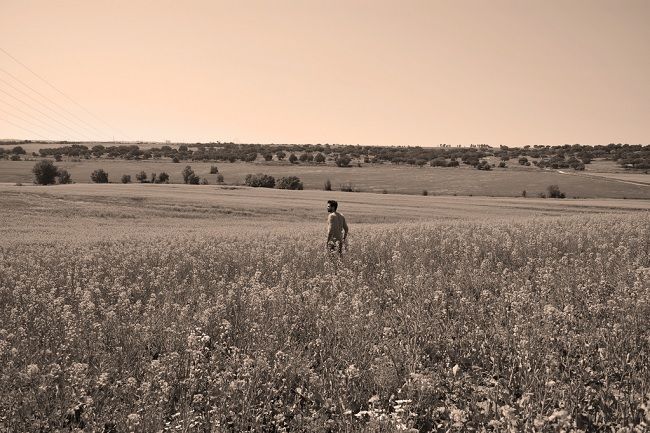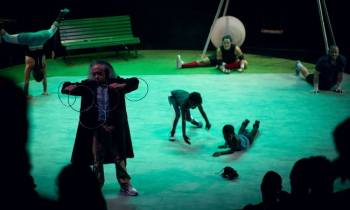Obras de referência da cultura portuguesa
"MAU TEMPO NO CANAL"
de VITORINO NEMÉSIO
Análise de Miguel Real
Tradução: Alexandra Leitão

Mau Tempo no Canal, romance de Vitorino Nemésio, publicado em 1944, constitui-se um romance do fim da época histórica iniciada com o aburguesamento intenso da sociedade portuguesa por via das Invasões Francesas, a independência do Brasil e a Revolução Liberal de 1820, prosseguida com a aceleração científica e técnica de Portugal por via da Regeneração e do Fontismo, continuada com a subversão das tradicionais hierarquias sociais nobres e eclesiásticas com a República e findada com a identificação ilusória e patrioteira entre poder e povo com a emergência do Estado Novo tentando, por vias laicas, uma reabilitação do Portugal católico, rural e marinheiro. Após publicação de Mau Tempo no Canal, em 1944, nascerá um outro Portugal: o Portugal dos Planos de Fomento Económico, da secessão da Índia, da eleição frustrada de Humberto Delgado, da revolta dos estudantes pela democracia, da emergência da Guerra Colonial, do 25 de Abril de 1974, da instauração da democracia, do fim do Império e da entrada de Portugal na Comunidade Europeia - um Portugal de massas, que deixará de falar francês para falar inglês, cujos heróis populares deixarão de ser venerados pela sua cultura, pelo heroísmo da sua ação, pela sua riqueza ou pela sua linhagem, passando a conquistar título de notoriedade pelo grau de destaque conquistado nos jornais e televisões.
Por isso, mais do que um espelho dos Açores, Mau Tempo no Canal é, sobretudo, um espelho do fim de um certo Portugal, o Portugal do fim do prestígio dos nomes aristocratas substituídos pelos nomes dos "Garcias" comerciantes e procuradores; do fim de uma economia assente em agregados familiares, substituída por uma economia empresarial; do fim das famílias alargadas identificadas com uma quinta ou um palácio, substituídos pelos prédios de apartamento; do fim da carroça e do cavalo como meios de transporte substituídos pelo automóvel e pela camioneta; do fim do azeite, do petróleo e do gás como meios de iluminação, substituídos pela eletricidade; do fim da cultura própria das comunidades de pescadores de caça à baleia, substituída pela cultura migrante americanizada; do fim dos transportes marítimos de passageiros, substituídos pelo avião; do fim da ocupação doméstica das mulheres substituída pelas profissões femininas; do fim de uma sociedade hierarquicamente ordenada de um modo atávico em privilégios irrevogáveis de superiores e em obrigações sociais de inferiores, substituída por uma sociedade popular e de massas.
Nenhum outro romance do Portugal de meados do século XX, ultrapassando as categorias estéticas do presencismo e do neo-realismo, espelha de forma tão esteticamente bela este fim dos fins de uma época como Mau Tempo no Canal, seja através do traço psicológico das personagens, seja através dos diversos enredos amorosos e sociais, seja ainda, e sobretudo, através das características atribuídas à atmosfera económica e social do romance. Mau Tempo no Canal, retratando o estaticismo das sociedades do Pico, de S. Jorge e do Faial, retrata igualmente a mentalidade portuguesa da primeira metade do século XX, em estado de bloqueamento social. Mau Tempo no Canal, enquanto romance do "fim", e para além de uma açorianidade intrínseca à própria narrativa, está longe de se constituir como um romance regionalista: ele possui igualmente a marca característica de uma identidade nacional portuguesa então em vias de se perder, como o evidencia o périplo dos edifícios da Praça Velha de Angra operando a ligação entre as antiga e atual função de cada um deles, num tom simultaneamente elegíaco e melancólico, torna claro que, por via dos Açores, o narrador está falando de Portugal. O Arquipélago é aqui evidenciado como metonímia de um Portugal decadente, abandonado à sua própria história, como uma espécie de jangada da história universal que, a despeito da modernização da Europa, vagueia à deriva arrastando classes, famílias, grupos sociais e pessoas singulares como se, em conjunto, formassem uma espécie de sombra clandestina da Europa: o que esta já perdera do ponto de vista social (a servidão dos camponeses, a pesca artesanal com risco da própria vida, o analfabetismo, a diferencialidade social gritante entre classes, a miséria económica das populações, a ausência de saúde pública…) permanece como um retrato vivo em Mau Tempo Canal.
Esta instalação anacrónica de Portugal e dos Açores no interior da História Contemporânea torna ambos refúgios de visões sebastianistas de salvação (a anunciada e intensamente desejada espera de Roberto Clark, que viria redimir a história familiar dos Clark Dulmo) e de contínuos sonhos de partida (Margarida ambiciona partir para Inglaterra, João Garcia para o Continente, os baleeiros para a América). Na estrutura do romance, esta contínua demanda portuguesa, que anseia por obter o que não tem ou não é, atinge o seu lugar por excelência com a permanente alusão à presumível descoberta de uma "suposta ilha ao norte da Terceira" por Fernão Dulmo, como se aos açoreanos, enquanto metonímia dos portugueses, lhes faltasse algo. Este sentimento de falha que atravessa a maioria das personagens de Mau Tempo no Canal, força a narrativa a postular contínuos desencontros sociais e permanentes frustrações individuais (Emília morre sozinha, abandonada, ainda que Henriqueta a procure; Margarida procura Álvaro Bettencourt, depois João Garcia, depois Roberto para, com a morte deste, casar rotineiramente com André Barreto; Januário procura ser como os Dulmo; Dª Catarina Clark vive desencantada com Diogo Dulmo, que procura amantes na Mariquinhas Escangalhada; as Peters vivem sozinhas, animando serões artísticos decadentes; o Barão e a Baronesa de Urzelina vivem isolados do mundo, com os camponeses de S. Jorge a seus pés, necessitando de fazer uma viagem de dois em dois anos para se sentirem vivos; tio Ângelo procura uma humilhante satisfação sexual nos recrutas do quartel da Horta; Henriqueta vive para si, recozendo interiormente ódios ancestrais; Mateus Dulmo, único digno sobrevivente aristocrata de antigas eras, toca harmónio meia-hora por dia, trata das suas rosas e preocupa-se com a pronúncia correta do latim cantado; o povo sofre de uma miséria profunda, sobrevivendo em casebres e sonhando com a América). Se este conjunto de personagens retrata indubitavelmente os Açores da primeira metade do século XX, ele é também um retrato vivo do todo de Portugal da mesma época.
A demanda de uma identidade perseguida gera, no romance, dois movimentos mentais contraditórios: o regresso ao tempo do Império, quando o barão de Urzelina e os Dulmo impunham a antiga ordem social e política aristocrática, imobilizada e cristalizada no tempo, garantia ideológica de uma sociedade rural, auto-suficiente, modesta, contente consigo própria, revendo-se nos mitos das Descobertas; e um desejo de fuga para a frente, com predomínio do comércio e do negócio sobre a ruralidade (família dos Garcia, o filho de Avelar) e da independência da mulher (Margarida) sobre os antigos códigos domésticos (Diogo Dulmo batendo em Margarida).
Todo esta atmosfera social e mental desenha-nos literariamente um Portugal do "fim", fundamentalmente o Portugal do fim da Monarquia (os capitães-donatários, os barões, as vastíssimas quintas, as terras cedidas diretamente pelo rei a antigas famílias, que agora vendem a novos ricos, como a Ribeira dos Flamengos, dos Dulmo), mas também o anúncio do fim do Império, identificando-se os Açores com a nau de Portugal em deriva histórica no exato centro da imagem que tem constituído parte importante da nossa identidade cultural - o mar. Nada havendo já por descobrir e restando-nos a pulsão da "demanda", as personagens revertem-se sobre si próprias, criando labirintos mentais monstruosos de saudade e desejo, não raro criando ou situações perversas (Henriqueta, Catarina, Diogo Dulmo, Ângelo...) ou situações trágicas (Margarida).
Do mesmo modo, Mau Tempo no Canal é dos poucos romances portugueses do século XX cuja personagem central, Margarida Clark Dulmo, encontra-se esteticamente à altura de um destino trágico, não já da tragédia clássica - e por isso é também um romance do fim -, onde os deuses se conjuram contra a vontade humana, mas da tragédia atual, onde os desencontros, os acasos, as perfídias subterrâneas, as pequeninas vaidades humanas, desembocam na mais pura e inviolável das rotinas: a anemia social, a indiferença, a passividade, o absentismo e, sobretudo, a resignação e a renúncia ao sonho. Margarida acaba por se casar com André Barreto, salvando assim da falência e da ruína a casa dos Dulmos. Margarida levará uma existência rotineira, parasitária, uma existência vazia. É nesta ausência de futuro - que não seja o futuro do tédio - que reside o elemento trágico da existência de Margarida. Neste caso, a tragédia não resiste na vontade de lutar ou no desejo de desafiar, mas na sua renúncia e na consequente interiorização de um profundo luto pela vida que nunca se terá.
Os títulos dos capítulos ("A Serpente Cega", "Uma Aranha e uma Teia", "Outra Aranha e Outra Teia", "Mortos e Vivos", "A Íris da Aranha", "Cucumaria Abyssorum", "As Aranhas Fecharam as Teias", "Fogo") geram desde logo a atmosfera de suplício e opressão social que forçará Margarida a desistir da sua vontade singular, conformando a sua "soberba" e o seu "orgulho" com os ditames sociais, resignando-se a um destino semelhante ao da mãe, reprimindo o seu desejo de viagem, de realização em Inglaterra, de despreconceituamento social. A tragédia - a pior das tragédias atuais – evidencia que, depois do seu casamento com André, Margarida não tem História, deixou de haver História para Margarida, estará viva para os filhos e para a sociedade e morta para si própria. Qual a diferença entre a nova existência de Margarida e a existência de Antígona vivendo entaipada?
"MAU TEMPO NO CANAL" by VITORINO NEMÉSIO
Mau Tempo no Canal, (English title: Stormy Isles, an Azorean tale) a novel by Vitorino Nemésio, was published in 1944. It is a novel of the end of the historic era that began with the intense growth of the middle classes in Portuguese society following the Peninsular Wars, the independence of Brazil and the 1820 Liberal Revolution, proceeded with Portugal’s scientific and technical acceleration through the Regeneration and “Fontismo”, continued with the subversion of traditional social and ecclesiastical hierarchies by the Republic and ended with the illusory and chauvinistic identification between power and people with the emergence of the New State, attempting through lay routes to rehabilitate a Catholic, rural and seafaring country. Another Portugal emerged after the publication of Mau Tempo no Canal in 1944, a Portugal of Economic Growth Plans, secession from India, Humberto Delgado’s thwarted election, the students’ revolt for democracy, the emergence of the Colonial War, the April 1974 revolution, the instauration of the democracy, the end of the Empire and Portugal’s accession to the European Community. A Portugal of the masses, which forsook French and began to speak English, whose popular heroes were no longer revered for their culture, their heroic deeds, their wealth or their lineage, but became well-known for their degree of exposure in newspapers and on television.
Rather than a mirror of the Azores, Mau Tempo no Canal is above all a mirror of the end of a certain type of Portugal, with the end of the prestige of aristocratic names which were replaced by the names of traders and solicitors called “Garcia”; the end of a family-based economy, replaced by an entrepreneurial economy; the end of extended families linked to an estate or a palace, replaced by apartment blocks; the end of the horse and cart as means of transport, replaced by the car and the bus; the end of olive oil, oil and gas as sources of light, replaced by electricity; the end of the individual culture of the whaling communities, replaced by an Americanised migrant culture; the end of maritime passenger transport replaced by the airplane; the end of a hierarchic society ordered atavistically by the irrevocable privileges of superiors and the social duties of inferiors, replaced by a popular society of the masses.
Setting aside the aesthetic categories typical of the era of “Presença” magazine and neo-realism, no other mid-20th century Portuguese novel mirrors this very end of an era like Mau Tempo no Canal, either through the psychological outline of the characters, the various amorous and social plots, or above all through the characteristics attributed to the economic and social atmosphere of the novel. Mau Tempo no Canal portrays the static quality of the societies of Pico, S. Jorge and Faial, but also depicts the Portuguese mentality of the first half of the 20th century, in a state of social occlusion. As a novel of the “end”, although Mau Tempo no Canal has an Azorean characteristic that is intrinsic to the narrative it is hardly a regional novel: it also has the characteristic mark of a Portuguese national identity about to disappear, as shown by the tour of the buildings in Angra’s Praça Velha, operating the link between the former and current function of each, in a simultaneously elegiac and melancholic tone, makes it clear that through the Azores the narrator is speaking of Portugal. The archipelago is highlighted here as a metonymy of a decadent Portugal, abandoned to its fate, as a sort of universal history raft which despite the modernisation of Europe, drifts aimlessly towing classes, families, social groups and individual persons as if together they formed a sort of clandestine shadow of Europe: what the latter had already lost from the social point of view (peasants’ servitude, line fishing that is life-endangering, illiteracy, the striking social difference between classes, people’s economic misery, the lack of public health…) is still a living portrait in Mau Tempo no Canal.
This anachronistic installation of Portugal and the Azores inside contemporary history makes both of them retreats of Sebastianist visions of salvation (the announced and intensely desired wait for Robert Clark, who would refresh the history of the Clark Dulmo family), and of endless dreams of departure (Margarida dreams of leaving for England, João Garcia for mainland Portugal, the whalers to the States). In the novel’s structure, this continuous Portuguese quest, the anxiety to obtain what it does not have or what it is not, attains its rightful place with the permanent allusion to the presumable discovery of a ”supposed island north of Terceira” by Fernão Dulmo, as if the Azoreans as a metonymy of the Portuguese were lacking something. This feeling of deprivation present in most of the characters in Mau Tempo no Canal forces the narrative to postulate continuous social disencounters and permanent individual frustrations (Emília dies alone and abandoned even though Henriqueta is looking for her; Margarida seeks Alvaro Bettencourt, then João Garcia, then Roberto and on the latter’s death, routinely marries André Barreto; Januário wants to be like the Dulmos; Catarina Clark is disenchanted with Diogo Dulmo who seeks mistresses in Mariquinhas Escangalhada; the Peters sisters live alone, enlivening decadent artistic soirées; Baron and Baroness Urzelina live isolated from the world with the peasants of S. Jorge at their feet, having to travel every two years to feel alive; uncle Angelo seeks humiliating sexual satisfaction in the recruits of Horta barracks; Henriqueta lives for herself, interiorly reliving ancestral hates; Mateus Dulmo, the only worthy aristocratic survivor of ancient times, plays the harmonium for half an hour a day, cares for his roses and is particular about the proper pronunciation of sung Latin; the people suffer deep misery in hovels whilst dreaming of America). If these characters really portray the Azores of the first half of the 20th century, it is also a living portrait of the whole of Portugal at that time.
The quest for identity pursued creates in the novel two contradictory mental movements: the return to the time of the Empire, when Baron Urzelina and the Dulmos established the former social and political aristocratic order, immobilised and crystallised in time, the ideological guarantee of a rural, self-sufficient, modest society, at peace with itself, and reflected in the myths of the Discoveries; and an impulse to flee forwards, where trade and business prevail over rurality (the Garcia family, Avelar’s son) and women’s independence (Margarida’s) over former domestic codes (Diogo Dulmo beating Margarida).
This social and mental atmosphere draws a literary picture of Portugal at “the end”, basically the Portugal of the end of the monarchy (the captains, the barons, the vast estates, the lands such as Ribeira dos Flamengos belonging to the Dulmos granted directly by the king to ancient families who now sell them to the nouveaux riche), but also the announcement of the end of the Empire, the Azores being identified with the ship that is Portugal historically adrift at the exact centre of the sea, an image that has been an important part of our cultural image. As there is nothing left to discover and as we still have the urge for the “quest”, the characters turn inwards, creating tortuous mental labyrinths of longing and desire, when not even creating perverse (Henriqueta, Catarina, Diogo Dulmo, Angelo) or tragic (Margarida) situations.
Similarly, Mau Tempo no Canal is one of the few 20th century Portuguese novels in which the central character, Margarida Clark Dulmo, is aesthetically suited to a tragic fate, not of classical tragedy (which is why it is also a novel of the end) where the gods conspire against human will, but of present tragedy, where disencounters, chance, subterranean perfidy, minor human vanities, lead to the purest, most inviolable of routines: social anaemia, indifference, passivity, absenteeism and above all resignation and relinquishing dreams. Margarida ends by marrying André Barreto, thus saving the house of the Dulmos from ruin and bankruptcy. Margarida’s existence is routine, parasitic, it is an empty life. The tragic element of Margarida’s existence lies in this absence of a future – except a future of boredom. In this case, the tragedy does not lie in the desire to fight or the will to challenge, but in her renunciation and in the consequent interiorisation of a profound mourning for the life she will never have.
The titles of the chapters (The Blind Serpent, A Spider and a Web, Another Spider and Another Web, The Dead and the Living, The Spider’s Iris, Cucumaria Abyssorum, The Spiders have closed their Webs, Fire) immediately create an atmosphere of suffering and social oppression that will force Margarida to give up her unique will, adapting her “arrogance” and her “pride” to social dictates, resigning herself to a fate similar to her mother’s, repressing her desire to travel, to reach fulfilment in England, of the absence of social prejudice. The tragedy, the worst of present tragedies, shows that after her marriage to André, Margarida has no history, history does not exist for Margarida, she is alive for her children and society but dead to herself. What is the difference between Margarida’s new existence and the existence of Antigone behind walls?
projeto desenvolvido pelo Centro Nacional de Cultura
com o apoio do Ministério da Cultura


 Divulgue aqui os seus eventos
Divulgue aqui os seus eventos














